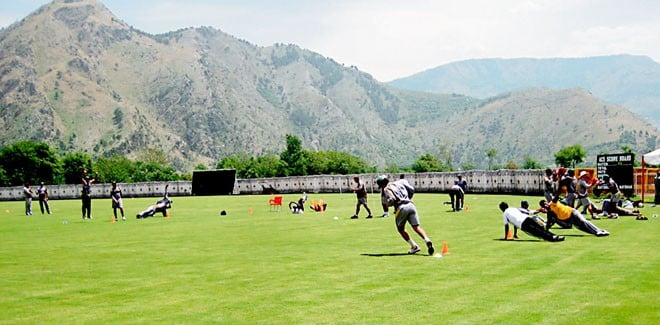
Pakistan's tour of Sri Lanka is of a very short duration and my interest and concern is more on the weather conditions and fitness levels required under these conditions

It has been a while before I took to my proverbial pen but the timing somehow seems to be just about right. After a long lay-off from competitive cricket, Pakistan team has embarked upon the tour of Sri Lanka and the first Test is already underway in Galle. And by the time this article appears in the newspaper, the result would already be known to all and sundry.
The Pakistan team has a got a new set-up. Waqar Younis is back as the head coach. Interestingly we have a batting and a spin coach too in the likes of Grant Flower and Mushtaq Ahmed. This extended support staff has already had its fair share of criticism but I will hold my guns for the time being as their performances have to be assessed over a reasonable period of time perhaps after the Australian series in the UAE could be the benchmark for this exercise.
So for many, any analysis on the current tour might just be a bit too late but I would still be inclined to do so in a different context and that too for a variety of reasons. Results aside, for me it is a difficult tour of a very short duration and as such rather than focusing on the performance, my interest and concern is more on the weather conditions and fitness levels required under these conditions. During the long lay-off period Pakistan Cricket Board (PCB) held a very strenuous summer camp of five weeks in Lahore where more than 30 probables had to go through a rigorous fitness regime. I think that this summer camp would have been more helpful if it was held in Karachi due to similar weather conditions in terms of day temperatures and humidity levels which the players are encountering in Sri Lanka. I am also told that in order to foster a habit of staying fit; the recently rolled-out central contracts have a binding clause for the players to maintain a minimum level of fitness during the off-season. This is a welcome sign and it implies that now players have to be responsible for their own fitness levels even when they are not playing regular cricket.
Having landed in Sri Lanka now, it is of utmost importance that the players must get acclimatised with the weather conditions in Sri Lanka and that too the sooner the better! This is monsoon season in the sub-continent. The temperatures may get high along with the humidity levels. With high temperatures, the players perspire profusely but evaporation takes place and that causes the body to cool. However when the humidity levels are high (the water vapour content in the air being high), the process of evaporation slows down and which in turn slows the coolness of human body. This means increased stress on body muscles resulting in cramps and serious injuries. Cramps that happen in the presence of a higher heat/ humidity index must be taken care of by ensuring adequate intake of liquids and mineral salts. The team management and the physio must have in place a strict monitoring and evaluation process in place so that they follow a preventive approach to cramps and injuries instead of a corrective one.
Given the fitness levels and weather conditions in Sri Lanka, another aspect to be looked at very carefully is workload management by the coaching staff and the captain during the Tests, ODIs and T20s. Both the head coach and the captain will have to devise a specific strategy for each bowler specially the fast bowlers so as to ensure that their workload is managed carefully. For example, the number of overs to be bowled during the whole day and the number of spells to be bowled have to be carefully managed. Sadly this aspect has been overlooked in the past tours to Sri Lanka and resultantly we have seen many fast bowlers getting seriously injured and disappearing into oblivion. Muhammad Zahid, a tear away fast bowler was a prime victim of this neglect. With Umar Gul on the injury list, we already know that we have severely depleted our fast bowling resources and there is not enough bench strength which is also unfortunately very low on experience too.
Teams touring Sri Lanka in the monsoon season have used cold jackets, cold collars, compulsory minimum intake of fluids and mineral salts for every player in order to ensure their fitness levels. I sincerely hope that our team management remains alive to these issues and is able to put in every effort to maintain a near clean slate on its injury list because from here onwards Pakistan team would be following a grueling schedule which involves series against Australia and New Zealand before World Cup 2015 to be held Down Under.